Resettlement lays foundations for community development. Alexis Hooi and Huang Zhiling report from Zhaojue, Sichuan.
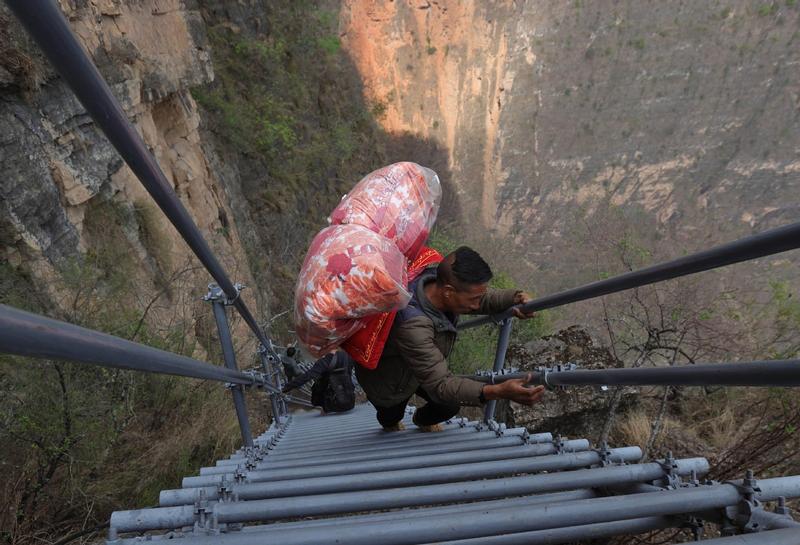 An Atuleer villager climbs down a metal ladder as he takes household goods to his new home in Zhaojue county, Sichuan province, in May. (JIANG HONGJING / XINHUA)
An Atuleer villager climbs down a metal ladder as he takes household goods to his new home in Zhaojue county, Sichuan province, in May. (JIANG HONGJING / XINHUA)
Yi ethnic group member Mose Ziha strummed his guitar as he looked into his mobile phone propped up in front of him.
The 44-year-old then burst into song, livestreaming in the Yi language a soothing folk melody about families warmly welcoming guests into traditional homes.
That was exactly what Mose was doing-only his home is a gleaming unit in a months-old apartment complex, complete with running water, electricity and other modern amenities.
"It is very comfortable here and I'm enjoying facilities I never had before. I have everything I need," he said of his apartment in Zhaojue county, Liangshan Yi autonomous prefecture, Sichuan province.
Mose belongs to one of more than 80 households from Atuleer village that started moving into the new apartments in the county seat in May as part of the latest efforts in a nationwide poverty alleviation drive.
Zhaojue has made significant achievements in poverty alleviation, in line with the nation's aim to eradicate extreme poverty-defined as living with less than 2,300 yuan (US$330) in annual income-by the end of this year.
By the end of last year, 136 of the 191 impoverished villages in Zhaojue had been lifted out of poverty. A total of 67,932 poor people from 15,239 households shook off poverty and the poverty rate dropped from 31.8 percent to 11.3 percent, according to local government figures.
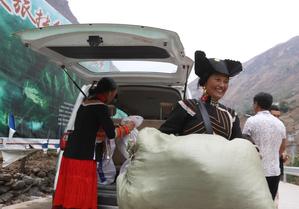 Members of the first group of villagers to relocate from the mountain village to apartments in the county seat pack items for their new homes in May. (JIANG HONGJING / XINHUA)
Members of the first group of villagers to relocate from the mountain village to apartments in the county seat pack items for their new homes in May. (JIANG HONGJING / XINHUA)
As of mid-June, the remaining 55 impoverished villages in the county, covering 7,081 households with 33,073 people, had all shed their poverty label.
In Atuleer alone, the per capita income of residents is forecast to rise to more than 9,000 yuan this year, nearly five times the 1,961 yuan income of poor households in 2014.
Measures to fight poverty range from housing and health to entrepreneurship and education. The county's plans include safe housing projects for more than 4,800 needy households, over 100,000 night school classes for farmers, nearly 10,000 skills and entrepreneurship sessions, and extensive public health and environmental projects for rural families.
Business enterprises and groups from more developed coastal areas also work with the agricultural sector and help build Zhaojue's industries.
Liao Yuchao, the deputy county head leading the anti-poverty push, said the approach is a multilevel, multipronged one, rooted in the provision of basic infrastructure and services and the development of income channels that tap the county's geographical and economic advantages and other strengths.
"This is a targeted effort. We must ensure that our residents continue to contribute to the economy and be part of society," he said.
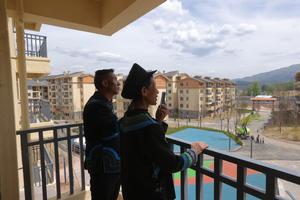 A newly resettled couple look out from their apartment in Zhaojue's Nanping community in May. (JIANG HONGJING / XINHUA)
A newly resettled couple look out from their apartment in Zhaojue's Nanping community in May. (JIANG HONGJING / XINHUA)
Tall order
Atuleer village, perched on a 1,400-meter-high cliff, attracted widespread attention four years ago when a newspaper published photos of local students going to classes by scaling a patchwork of mountainside rattan ladders that stretched 800 meters.
The treacherous trip was also the main way for villagers to get to the nearest market several kilometers away once a week to obtain basic necessities and sell crops such as Sichuan peppercorns and walnuts.
After he learned about the villagers' plight in a TV broadcast, President Xi Jinping expressed concern about them and their reliance on the rattan ladders during a discussion with National People's Congress deputies from Sichuan three years ago during the annual two sessions in Beijing.
Xi said the whole process of poverty alleviation needed targeted policies and precise, detailed measures, similar to those used in making intricate embroidery.
To help the villagers, the county and prefectural governments provided 1 million yuan to construct a handrailed 2,556-step ladder made of metal poles, making the climb safer and reducing the travel time to the nearest town by one-third to an hour.
Ake Jiushe, deputy head of the county's information department and author of a book detailing the development of Atuleer in recent years, said the improved climbing conditions have certainly been a step up for progress, with many tourists also heading to the area and contributing to the local economy.
The village is set to become an anchor point for local authorities' focus on developing rural tourism into a pillar industry, including a few households staying behind to offer food and lodgings to visitors even as most villagers move out for better work and living conditions in Zhaojue.
"The improvements have been remarkable since Atuleer took the spotlight, and we're looking ahead to the next steps in its development," Ake said.
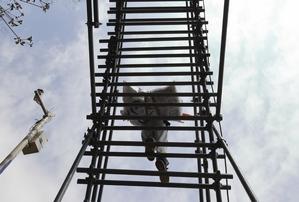 A resident of Atuleer carries family items down the ladder. (JIANG HONGJING / XINHUA)
A resident of Atuleer carries family items down the ladder. (JIANG HONGJING / XINHUA)
Solid support
At the county seat, under government subsidy plans for the new apartments, each Atuleer villager pays about 3,000 yuan for 25 square meters, with the payment capped at 10,000 yuan for the largest 100-sq-m unit housing a family of four members or more. Each family also receives nearly 2,000 yuan to help them purchase household items.
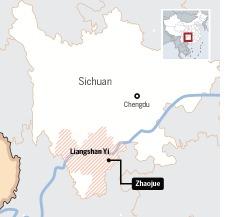
The government support is significant considering housing prices in the county can average about 4,000 yuan per square meter for similar properties, residents said.
Mose, the villager, said the recent influx of tourists, who bought his walnuts, olive oil and other produce, helped to more than double his annual income to about 10,000 yuan. His walnut yield alone rose twofold to about 15 yuan a kilogram thanks to the increase in tourist numbers.
Like other relocated Atuleer villagers, he maintains his small plot of land in the mountains even as he looks for work in urban areas to boost his income after moving from a cliffside adobe hut to his 50-sq-m one-bedroom apartment, which he shares with his brother.
Mose livestreams songs and other performances for social media fans-many of whom buy his crops-with at least 5,000 of them on major video-sharing site Douyin.
Api Lari, deputy Party secretary of the new Yiwu community, which houses more than 2,700 resettled villagers like Mose, said site amenities include a canteen, a residents' cultural activities center, children's learning areas and even a retail strip offering traditional ethnic products and artwork such as elaborate Yi embroidery to further supplement residents' incomes.
"They are not simply transitioning from adobe to concrete; these people are also getting support to develop their lifestyles and mindsets," Api said.
Mose Wuha, a resettled Atuleer villager in the nearby Nanping new housing area, moved to his new 100-sq-m, three-bedroom apartment on the top floor of a five-story block in mid-May. His 19-year-old son, the eldest of his four children, is living with him while they wait for the rest of the family, who will move from the cliffside village in the coming months.
Mose Wuha, 48, said he ran a stall at the peak of Atuleer, selling refreshments to tourists after they were drawn to the area when the handrailed metal ladder was set up. That helped him make up to 2,000 yuan a month, a substantial upgrade from the subsistence farming he had previously practiced. He is planning to open a shop in his new community to continue selling local items, including his own Atuleer crops.
"This is a great change for us. We can keep our links with Atuleer and access better social benefits in the county seat, like healthcare," Mose Wuha said. "My children are already getting opportunities I never had. My youngest daughter, who is 7, can actually speak better Mandarin than me. She is enjoying school in Atuleer and we are all looking forward to living together again once the move is completed."
Learning advantage
The local school at the foot of Atuleer, which offers classes up to primary level, is also being upgraded, with room-and-board facilities that can help accommodate 600 people, on top of annual subsidies of 4,500 yuan for each student.
Gao Juan used to work in retail but decided to teach at the school two years ago to do more for the community. The 30-year-old, who teaches Chinese and math, said the positive impact of the poverty alleviation measures on her students has been very heartening.
"Parents themselves are also caring more about the education of their children. Even in terms of better health and hygiene, the students help influence their families," she said.
Eleven-year-old student Jiba Zili said she enjoys her classes, which used to take about three hours to reach from her home on the mountaintop before the metal ladder was built. That climb, reduced by an hour, is also more pleasant now, she said.
Zili said she is looking forward to the new communities in the county seat. "I also want to visit Beijing," she said.
On the slopes en route to Atuleer, Chimu Ashi, 54, sells village specialties to tourists trying out the climb. She makes up to 300 yuan a day during peak travel to the increasingly popular scenic spot, but before, she had to rely solely on farming to survive.
"I've been here since I was 5," she said. "This is a big improvement."
Contact the writers at alexishooi@chinadaily.com.cn



